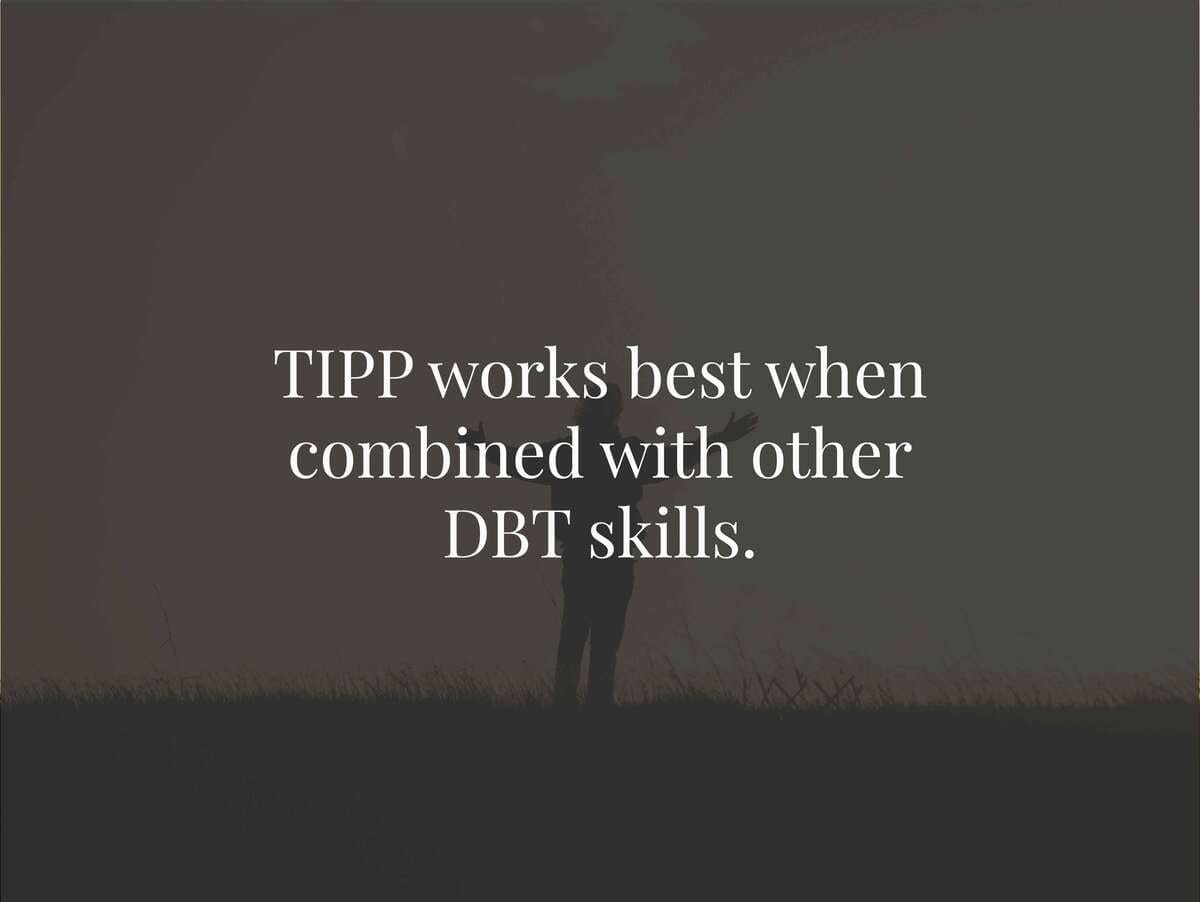The TIPP skill in Dialectical Behavior Therapy (DBT) is a powerful toolset for quickly managing intense emotional states. It's especially useful for people in addiction recovery, where emotional spikes can trigger cravings, relapse, or unsafe behavior. TIPP works by engaging the body’s physiology to bring emotional states back into balance.
What Does TIPP Stand For?
TIPP is an acronym that stands for:
- Temperature
- Intense Exercise
- Paced Breathing
- Paired Muscle Relaxation
These four skills work together to activate the body’s natural calming systems, making them particularly useful when emotions are overwhelming or feel uncontrollable.

Temperature: Lower Emotional Intensity Fast
Changing your body’s temperature is the first step. Cold exposure can reset your nervous system within seconds.
Cold activates the body’s “dive reflex,” which lowers your heart rate and increases blood flow to vital organs, reducing the fight-or-flight response.
Try these techniques:
- Splash cold water on your face
- Hold a cold compress to your cheeks and eyes
- Dip your face into a bowl of cold water for 10–15 seconds
Use this when you’re panicking, angry, or flooded with urges.
Intense Exercise: Discharge Stress Hormones
Short bursts of exercise can rapidly reduce stress by burning off adrenaline and cortisol.
Effective options include:
- 60 seconds of jumping jacks
- Running up stairs or in place
- Shadowboxing or punching a pillow
This is most effective when your emotions feel stuck in your body and need a physical outlet.
Paced Breathing: Calm the Mind and Body
Slowing your breath helps shift your nervous system into a parasympathetic (calm) state.
Use the following breathing pattern:
- Inhale for 4 seconds
- Exhale for 6 to 8 seconds
- Repeat for 2 to 5 minutes
This technique is helpful when your thoughts are racing or you're on the edge of a panic attack.
Paired Muscle Relaxation: Release Tension from the Inside Out
This technique involves tensing muscle groups while inhaling, then releasing the tension while exhaling.
How to do it:
- Inhale and clench your fists
- Exhale and fully release
- Repeat with different muscle groups (shoulders, jaw, legs)
Paired muscle relaxation is best for moments when you're feeling tight, on edge, or disconnected from your body.
Why TIPP Matters in Recovery
TIPP gives recovering individuals a way to interrupt destructive impulses. These skills are not about avoiding emotions but resetting the body’s alarm system so that the emotional part of the brain is no longer in control.
For someone who’s recently stopped using drugs or alcohol, intense emotions can feel unmanageable. TIPP provides fast, effective strategies to return to stability without turning to substances.
Individuals who build a strong foundation with TIPP often find they are better equipped to handle real-life triggers, confrontations, and emotional flashbacks. These four physical strategies work as a reset button when everything feels like too much.
Incorporating DBT as part of a recovery plan equips clients with tools like TIPP that work not only in therapy but also in real-world situations where relapse risk is high.

Other Recovery-Focused Skills That Reinforce TIPP
TIPP is most effective when paired with other skills in the DBT toolbox that target emotional understanding, long-term regulation, and crisis management.
Understanding the full DBT skills list can provide clarity around which strategies help during different stages of recovery. While TIPP is used in emotional emergencies, other DBT tools like radical acceptance, interpersonal effectiveness, and self-soothing offer longer-term emotional resilience.
Building distress tolerance is also essential in early recovery. Skills like distraction, self-soothing, and turning the mind can help you ride out a craving without reacting to it. These techniques complement TIPP by giving you options when cold water or exercise aren’t immediately accessible.
To stay steady during periods of mood swings or emotional burnout, emotion regulation strategies help reduce vulnerability. These include managing sleep, eating balanced meals, and checking in with your emotions regularly—so you can prevent crises rather than react to them.
The TIPP skill is an essential part of DBT because it gives fast access to emotional control. But it’s most powerful when it sits alongside long-term tools for building a stable, substance-free life.




